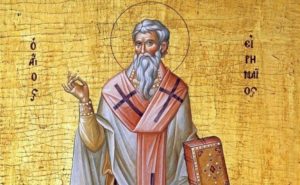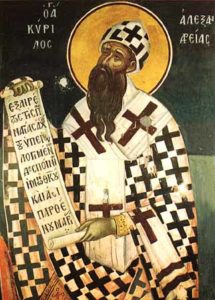 This week we celebrate two bishop saints of the Early Church, i.e. Saints Cyril and Irenaeus. Both are from the Near East, once the home of a vibrant Christian culture. While most of that culture has passed away in the last millennium, the remaining small Christian communities have been destroyed practically overnight by radical Islam. That culture must be defended, and like Remi Brague, I feel I have a responsibility, to the best of my abilities, of rescuing the cultural heritage of Christianity in the Near Eastern world. Consecrated life finds its beginnings there, and we can learn much it, especially its emphasis on asceticism. The Church Fathers, in our case Saints Irenaeus and Cyril, saw asceticism as necessary for all Christians, and this is what I would like to focus on.
This week we celebrate two bishop saints of the Early Church, i.e. Saints Cyril and Irenaeus. Both are from the Near East, once the home of a vibrant Christian culture. While most of that culture has passed away in the last millennium, the remaining small Christian communities have been destroyed practically overnight by radical Islam. That culture must be defended, and like Remi Brague, I feel I have a responsibility, to the best of my abilities, of rescuing the cultural heritage of Christianity in the Near Eastern world. Consecrated life finds its beginnings there, and we can learn much it, especially its emphasis on asceticism. The Church Fathers, in our case Saints Irenaeus and Cyril, saw asceticism as necessary for all Christians, and this is what I would like to focus on.
Saints Irenaeus and Cyril were from regions that are now Muslim. Cyril was from Alexandria in Egypt, and Irenaeus was from Smyrna, now Izmir, Turkey. Both were Greek speaking cities in the Roman Empire. During these early centuries of Christianity, the East was more cultured than the West. While that seems odd to us we must remember that even the Romans considered the East to be more civilized than the West. So Irenaeus was not moving up when he went to Lyon to preach the Gospel. We no longer make a concerted effort to remember the past, and in order to appreciate the consecrated life we must not forget the cultural treasures of Christianity in the East, particularly asceticism. Cyril and Irenaeus are among the greatest figures of the Church and they both practiced asceticism, encouraging all Christians to do likewise. This short essay will focus on asceticism in the East.
St. Paul, who founded many Christian communities in the East, preached life in Christ or life according to the Spirit. A recurring theme in many of his epistles is adoptive sonship, i.e. our means of participation in the true spiritual worship of the Trinity, the source of all life. For participation in the divine life, Paul encouraged the unmarried and widows not to marry (1 Cor.7), since he thought marriage was bound up with many troubles in this life. Such advice, while not denigrating marriage – Paul had a very high view of marriage, calling it a great “mystery” in his Letter to the Ephesians, played a role in the origins of the consecrated life. Monasticism was an aspect of this. Monks did not leave the world behind but entered the true depth of reality, i.e. God. They became living icons of the divine life, something many people sensed, inspiring many to live like them. This gave rise to communal monasticism. Let’s take St. Anthony the Great from Egypt as an example: he encountered the beauty of Christ in the Gospel story of the Rich Young Man and was inspired to leave everything to seek God and find union with Him in the desert. As creatures with unruly passions, union with God was only required through discipline. Cyril’s predecessor, St. Athanasius, popularized Anthony’s asceticism throughout the Christian world by his book The Life of Anthony the Great. This book inspired many young men to set out to become ascetics like Anthony.
Irenaeus was taught by the bishop and martyr Polycarp, a disciple of John the Apostle. From leaning on the heart of Christ to remaining with Christ during his Passion, John was radically intimate with the Lord. This experience was handed on to Polycarp who, in turn, handed it on to Irenaeus. Irenaeus’ lifelong enemy were the Gnostics, a heretical group that saw creation as evil and something to be cast off. In his great work Adversus Heresus, Irenaeus defended the goodness of creation and a healthy form of asceticism. While Irenaeus lived a century before Anthony the Great he was already laying the foundations for Christian asceticism. He saw it as a remedy for the waywardness of creation, realigning the passion back into unity with God. This was something all Christians were called to do and not just monks.
 St. Cyril of Alexandria agreed. While he is mostly known for his conflict with Nestorius at the Council of Ephesus (431), his works on asceticism need to be revived. He applied asceticism to scriptural exegesis. For him, exegetes must be ascetics. Such discipline would clear the mind, allowing the exegete to truly live in the Spirit so as to correctly discern the meaning of Scripture. Only the Spirit can unveil the meaning of the text, and discipline is necessary to be attuned to the Spirit. There is evidence that Cyril spent significant time in the Egyptian desert, living with the monks. As a bishop he called his flock to practice bodily and spiritual disciplines. In a culture that encourages license in practically everything but work, athletics and finance, it might be worthwhile to look at the writings of these early Church Fathers and study the lives of desert monks so as to better appreciate the value of asceticism for all the baptized.
St. Cyril of Alexandria agreed. While he is mostly known for his conflict with Nestorius at the Council of Ephesus (431), his works on asceticism need to be revived. He applied asceticism to scriptural exegesis. For him, exegetes must be ascetics. Such discipline would clear the mind, allowing the exegete to truly live in the Spirit so as to correctly discern the meaning of Scripture. Only the Spirit can unveil the meaning of the text, and discipline is necessary to be attuned to the Spirit. There is evidence that Cyril spent significant time in the Egyptian desert, living with the monks. As a bishop he called his flock to practice bodily and spiritual disciplines. In a culture that encourages license in practically everything but work, athletics and finance, it might be worthwhile to look at the writings of these early Church Fathers and study the lives of desert monks so as to better appreciate the value of asceticism for all the baptized.